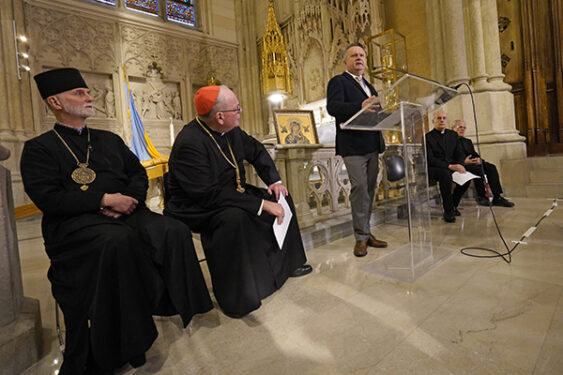
MIDTOWN — Before Ukraine’s ambassador to the United Nations participated in a March 24 vote to get more aid to Ukraine, he stood behind a podium inside St. Patrick’s Cathedral in Manhattan and called on the international body to take swift action against Russia citing decades of wrongdoings worldwide that have gone unpunished.
“You may have a very beautiful strong structure that is invaded by poisonous mold and that’s exactly what’s happened to the United Nations,” Sergiy Kyslytsya told reporters. “If you do not care about the mold, if you do not remove the mold, if you just put a fresh paint on the mold it eats the structure no matter how often you put fresh paint on there.”
“That’s exactly what happened. For 30 years since the dissolution of the Soviet Union, we’ve been closing our eyes on many instances of pure evil which were committed by the Russian Federation,” he continued. “We are putting fresh paint on the evil. That’s the same thing as having someone sinful attending church services but not repenting, and so I call on the United Nations to stop putting the fresh paint on the wall.”
In particular, Kyslytsya highlighted actions by the Russian Federation in Moldova, Syria, Georgia, and the Central African Republic.
Kyslytsya’s comments were made at a news conference alongside Cardinal Timothy Dolan of New York, Archbishop Borys Gudziak of the Ukrainian Catholic Archeparchy of Philadelphia, Archbishop Gabriele Caccia, the Vatican’s permanent observer to the United Nations, and Msgr. Peter Vaccari, the president of the Catholic Near East Welfare Association (CNEWA).
Kyslytsya and the Catholic leaders gave their perspectives on the situation in Ukraine a month after the initial invasion and spoke on the need for prayer, aid, and truthful information.
Kyslytsya left the cathedral for the U.N. headquarters right after his comments, in which he touted the U.N. resolution that passed later in the day as important given the dire circumstances many Ukrainians still face at home. The resolution — which 140 of 193 member states voted in favor of — demands civilian protection and humanitarian access in Ukraine. It further criticizes Russia for creating a “dire” humanitarian situation with its invasion.
President Joe Biden on March 24 promised a $1 billion commitment in humanitarian assistance to Ukraine, and said the U.S. will welcome up to 100,000 Ukrainian refugees.
Archbishop Gudziak, who has previously spoken about the need for the U.S. government to create a plan to welcome Ukrainian refugees, called the move “an important step.” As of March 24, the number of Ukrainian refugees was over 3.6 million, according to data from the United Nations High Commissioner for Refugees.
“It’s a start, but it’s very important that the American people’s desire to receive refugees will be made possible by some legislation and some policy,” Archbishop Gudziak said, adding that “it’s important to realize that 90% of these refugees are women and children.”
“There really is no basic fear and that is why the process should be streamlined,” Archbishop Gudziak said.
Kyslytsya noted, however, that countries need to prepare for a greater risk of human trafficking as they take in Ukrainian refugees.
“It’s not theoretical. We are not speaking about possibility,” Kyslytsya said. “We are speaking about three million refugees scattered across Europe and united countries of the world. They are very vulnerable. Therefore, it should not be a premise or academic discussion. That should be a part of the planning of every single government where refugees are.”
Archbishop Caccia, before he departed for the U.N. meeting, called the invasion of Ukraine “a defeat of our common humanity.” He reiterated the Vatican’s offer to mediate discussions between Ukraine and Russia, though he acknowledged that the most important goal is for the war to stop and weapons to be put down.
“Then take care of people and then start talking about possible solutions,” Archbishop Caccia said.
Archbishop Caccia spoke about the consecration of Russia and Ukraine to the Immaculate Heart of Mary that takes place today as well, saying that “we believe that God can change hearts and can put the seed of fraternity that appeals to the best part of all of us.” Bishops and priests worldwide will join Pope Francis in the consecration.
The leaders also spoke about the way the invasion of Ukraine has galvanized the world.
“I’m 72 years old and I can never remember the world being so united as it is now; united with the people of Ukraine and united against the Russian atrocity led by Putin,” Cardinal Dolan said, later revealing that the second collection basket for Ukraine at archdiocesan Masses has collected $300,000 and “continues to grow.”
Cardinal Dolan added that he spoke with Supreme Knight of the Knights of Columbus Patrick Kelly, who told him they have received $2 million in donations. Msgr. Vaccari said that the Catholic Near East Welfare Association has disbursed about $1,064,00 for immediate relief to Ukrainian families.
Archbishop Gudziak, who estimated that $50 million has been raised for Ukraine between all of the dioceses and organizations that are contributing, called what is happening a “transformational moment for the world” that Ukraine is at the heart of.
“There’s a great tragedy, but there is a great victory,” Archbishop Gudziak said. “Europe is united. The North Atlantic relationship has gotten a new purpose. People are starting to believe in things.”
